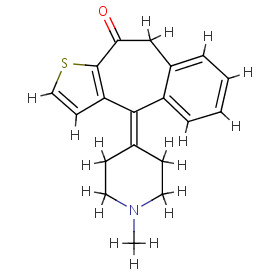 Ketotifen is an anti-histamine available in two forms: eye drops to treat conjunctivitis, and oral tablet for asthma control. It is also well-known in the bodybuilding community as a means of up-regulating beta-2 adrenergic receptors that have been down-regulated from the use of potent beta-2 receptor agonists like clenbuterol. Beta-2 agonists can be highly lipolytic and are often used during periods of dieting down. By inhibiting the desensitizing effect on the receptors, the user can take advantage of the fat loss effects of the agonists for longer periods of time. Ketotifen’s anti-histamine effect is via mast cell stabilization. Mast cells are found in many tissues, storing histamine for their involvement in the allergic response. A mast cell stabilizer (such as ketotifen) basically stabilizes the cell (no real surprise there given their name) and prevents histamine release. This is how it helps asthmatics.
Ketotifen is an anti-histamine available in two forms: eye drops to treat conjunctivitis, and oral tablet for asthma control. It is also well-known in the bodybuilding community as a means of up-regulating beta-2 adrenergic receptors that have been down-regulated from the use of potent beta-2 receptor agonists like clenbuterol. Beta-2 agonists can be highly lipolytic and are often used during periods of dieting down. By inhibiting the desensitizing effect on the receptors, the user can take advantage of the fat loss effects of the agonists for longer periods of time. Ketotifen’s anti-histamine effect is via mast cell stabilization. Mast cells are found in many tissues, storing histamine for their involvement in the allergic response. A mast cell stabilizer (such as ketotifen) basically stabilizes the cell (no real surprise there given their name) and prevents histamine release. This is how it helps asthmatics.
Mast cells are also heavily involved in defence against infection, facilitating healing in damaged tissue and promoting blood flow. Researchers at Harvard have recently found that under certain conditions mast cells build up to levels well beyond that required, becoming very unstable and causing inflammation. They also found a ton of them in obese and diabetic human fat tissue – much more than found in normal human fat tissue. To investigate, the researchers fattened up some mice to obese proportions and split them into four groups – control, healthy diet, mast cell stabilizer, or a combination of a healthy diet and mast cell stabilizer. While the mast cell stabilizer group improved significantly, the combination group basically recovered 100%. Not content, the researchers tried to fatten up some mast cell-deficient mice with no success.
This was a rodent study and there is no evidence that this effect will occur in humans, so it’s not something I can recommend, but the prospect is exciting for sure. Next up for the researchers is to take this new investigation to primates – then we will know a lot more.
Source: Liu J, Divoux A, Sun J, Zhang J, Clément K, Glickman JN, Sukhova GK, Wolters PJ, Du J, Gorgun CZ, Doria A, Libby P, Blumberg RS, Kahn BB, Hotamisligil GS, Shi GP. Genetic deficiency and pharmacological stabilization of mast cells reduce diet-induced obesity and diabetes in mice. Nat Med. 2009 Jul 26.
